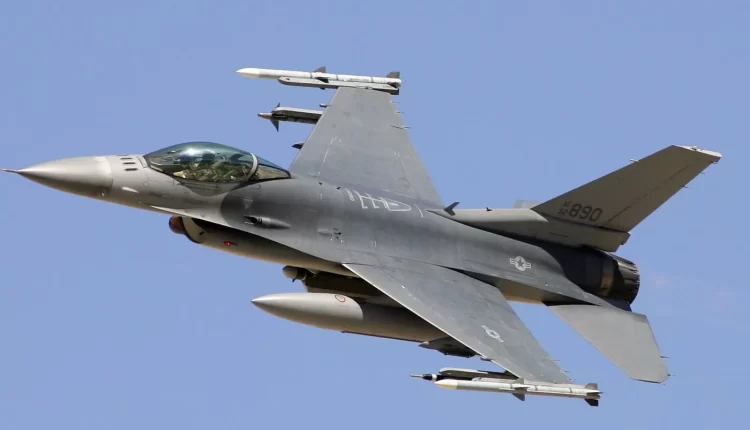QAMISHLI, Syria (North Press) – Turkey’s Foreign Minister Mevlut Cavusoglu is in Washington DC today attempting to finalize the sale of US fighter jets to his country.
The deal will likely be contingent on a number of other issues, including Turkey’s plans to invade northeast Syria, rising tensions with Greece, as well the accession of Sweden and Finland to NATO.
Turkey was excluded from the US’ F-35 fighter jet program in 2019 over its purchase of Russian missile defense systems. The country was sanctioned under the US Countering America’s Adversaries Through Sanctions Act (CAATSA).
Today, Ankara wants to finalize the purchase of 40 F-16 fighter jets, an older model. US President Joe Biden has asked Congress to approve the $20 billion deal.
According to some voices in the US capital, including the former US Secretary of State, Mike Pompeo, the sale of F-16s would be in violation of CAATSA.
Yet whether the deal will pass will likely depend on the two countries seeing eye-to-eye on a number of geopolitical issues, rather than its legality.
We may suddenly come
According to Voice of America (VOA), a state-owned news agency, Turkey’s plans to invade northeast Syria are likely to be on the agenda at the bilateral meeting held in Washington DC today.
Last November, Turkey threatened to mount a cross-border incursion into territories held by the Syrian Democratic Forces (SDF) following a bombing in Istanbul which killed six people and injured 80 others. Turkey blamed the attack on the SDF, but the latter categorically denied any involvement.
Ankara was prevented from launching its all-out invasion by simultaneous American and Russian vetoes. This would have been Turkey’s fourth invasion of northern Syria.
The US seemed to be woken from its Syrian slumber as the SDF halted anti-ISIS operations and a Turkish drone strike hit a joint US-led Coalition-SDF base.
According to some sources quoted by VOA, the F-16s’ sale are unlikely to go through without Turkish assurances that it will not attempt another incursion.
While many in Washington, including the Pentagon, have issued statements voicing their rejection of a Turkish invasion, Ankara may go at it nonetheless. To truly contain Turkey, particularly in regions with no US presence – such as Kobani, Manbij and Tel Rifaat, which are the areas Ankara has set its sights on in northern Syria – a formal agreement will be necessary.
In a recent interview with Al-Monitor, SDF commander Mazloum Abdi said his forces expect a Turkish attack against the city of Kobani in February. “America’s efforts to curtail Turkey are falling short,” he added.
Turkish President Recep Tayyip Erdogan has continually threatened the region with war. As presidential and general elections in May 2023 near, he is likely to attempt another war against the Kurdish-majority regions of northern Syria. “We may suddenly come one night,” Erdogan said months back.
Launching a ground military operation in Syria is “possible at any time depending on the perceived threat level,” senior Turkish official said on Saturday.
On Saturday, Ibrahim Kalin, spokesman and foreign policy adviser for Erdogan, reiterated that a ground operation is “possible at any time depending on the perceived threat level.”
Greece is not spared
Worryingly, the Turkish president made a similar remark about his Mediterranean neighbour, Greece, adding that Athens was within reach of Turkish missiles.
This unprecedented escalation in hostilities, as a result of Turkish territorial and maritime claims that violate Greece’s sovereignty, has pushed Athens to upgrade its arsenal. It will likely join the F-35 program that Turkey was barred from.
Erdogan’s threats are popular at home, but they are not merely for domestic consumption. According to the American Hellenic Institute, a lobbying group, Turkey violated Greek airspace 11.000 times in 2022 alone. Future military action against Greece is, though improbable, a possibility.
Cavusoglu has warned that the US needed to “pay attention” to the balance of power in the region. What makes this an issue requiring special US attention, and one which will likely be on today’s agenda, is that both Turkey and Greece are NATO partners.
NATO woes
The transatlantic military alliance is in disarray – and not just because one of its members is threatening war on another.
Turkey is a crucial NATO ally. It played a critical role in ensuring a grain deal between Ukraine and Russia last year. Yet, increasingly, it has cozied up to NATO’s enemies. This month, Turkey initiated rapprochement efforts with the government in Damascus, a move which the US has condemned.
Yet Turkey’s new friends are unlikely to be deal-breakers at today’s meeting. Much more important to Washington is Turkey’s obstruction of Sweden’s and Finland’s NATO accession process. According to official sources quoted in the Wall Street Journal (WSJ), the F-16 deal “depends” on an amicable solution to this issue.
Hungary (who will sign in February) and Turkey are the last holdouts in endorsing the Nordic countries’ bids to join NATO following Russia’s invasion of Ukraine.
Erdogan has held their accession hostage, demanding both countries, and especially Sweden, extradite Turkish-born “terrorists” living in their countries. On January 15, the Turkish president revised the figure of alleged enemies of the state up to 130. Last summer, he had demanded only 33.
Until now, sources within the Turkish government categorically rejected allowing the two countries to join NATO before Turkey’s general elections in May.
Blowback
Erdogan’s antics are making him enemies in Washington. John Bolton, a Republican hawk, argued that Turkey’s NATO membership should be put “on the chopping block” in a recent WSJ opinion piece.
Most American officials would not yet go that far. Yet Erdogan’s destabilizing influence is creating real problems for his country. US Senator Bob Menendez, chair of the Senate Foreign Relations Committee, said he would vote against the F-16 deal. “Until Erdogan ceases his threats, improves his human rights record at home — including by releasing journalists and political opposition — and begins to act like a trusted ally should, I will not approve this sale,” he declared.

